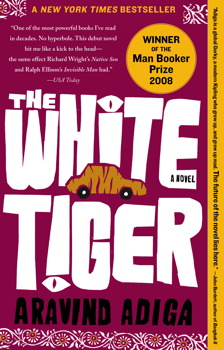I recently revisited Aravind Adiga’s THE WHITE TIGER to discern what about it so riveted and enchanted me when I first read it in college. I figured it had to be the first sentence. This was a book that enraptured me with its utterly distinct and unrelenting voice, and I thought it must have been the first sentence where I got a glimpse of that.
Not quite. It’s hard to even say if there is a first sentence. The book opens: “For the Desk of His Excellency Wen Jiabao, The Premier’s office, Beijing, Capital of the Freedom-loving Nation of China.” It continues: “From the Desk of: ‘The White Tiger,’ A Thinking Man, And an Entrepreneur, Living in the world’s Center of Technology and Outsourcing, Electronics City Phase 1 (Just off Hosur Main Road), Bangalore, India.”
It might take a minute for the first-time reader to realize the whole book is going to be written in letters from this “Thinking Man,” Balram Halwai, to the Chinese Premier Wen Jiabao (who has no idea who this entrepreneurial son of a rickshaw puller is). I doubt it could take more than that opening and the fact that there is no typical opening sentence to see that Balram, our narrator, is fiercely, hilariously, one-of-a-kind.
THE WHITE TIGER is his story. The story of how Balram rose out of his rural village to become a driver for one of his village’s landlords and then not exactly fell out of favor but more hurdled deliberately out of it. (Suffice it to say, to avoid spoilers, there’s more than one violent death along the way.)
It is also the story of the emotional life of India’s underclass—Balram is a modern-day Underground or Invisible Man, who speaks for the otherwise anonymous poor and calls to mind Dostoevsky and Ellison in his eloquent, explosive take-downs of the moral order as we know it. This Thinking Man’s thoughts are as profound and penetrating as they are hilarious and wild.
I read THE WHITE TIGER in college, as I said. At the time, knowing nothing about contemporary publishing, I thought I was one of its few discoverers. But even if I had known it won the Booker Prize in 2008 and was a massive bestseller, I still would have felt that kind of intimacy about the experience, I believe. I still would have thought Balram to be someone I uniquely loved and understood. That’s what is so extraordinary about the experience of reading THE WHITE TIGER—most people who do so feel it’s uniquely theirs, that Balram is their crazy, philosophical spokesperson.
Now, almost ten years later, after reading all of Adiga’s other books and having had the extraordinary good luck and privilege to be one of the editors of his latest extraordinary novel, SELECTION DAY (coming January 2017), I still, when I open back up THE WHITE TIGER, find myself feeling like I’m doing so for the first time. The newness of Adiga and his indelible, indefatigable narrator is ever there, and I can’t help wonder what they’ll say to me this time.










